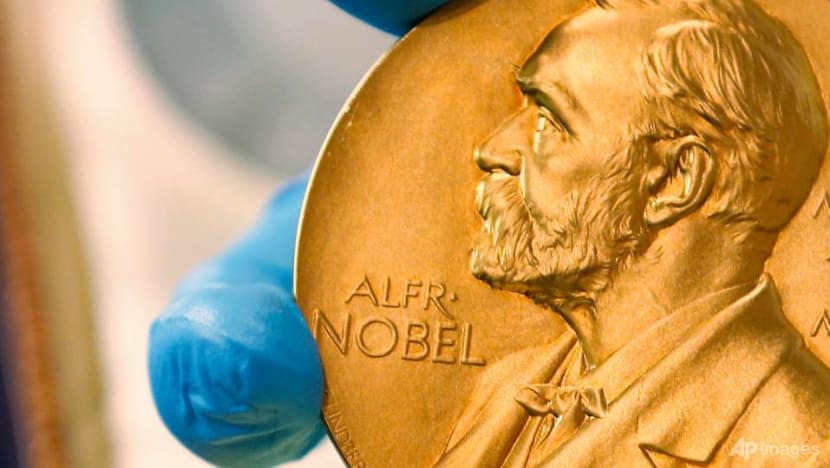
The World Food Programme has won the 2020 Nobel Peace Prize for its efforts to combat hunger and food insecurity around the globe.
OSLO: The World Food Programme won the Nobel Peace Prize on Friday (Oct 9) for its efforts to combat hunger and improve conditions for peace in conflict areas, the Nobel committee said.
"With this year's award, the Norwegian Nobel Committee wishes to turn the eyes of the world towards the millions of people who suffer from or face the threat of hunger," Nobel committee chairwoman Berit Reiss-Andersen said on unveiling the winner in Oslo.
The WFP was honoured for "its efforts to combat hunger, for its contribution to bettering conditions for peace in conflict-affected areas and for acting as a driving force in efforts to prevent the use of hunger as a weapon of war and conflict", the jury said.
Whether delivering food by helicopter or on the back of an elephant or a camel, the WFP prides itself on being "the leading humanitarian organisation" in a world where, by its own estimates, some 690 million people - one in 11 - go to bed on an empty stomach.
Shortly after the announcement, a spokesperson for the organisation said it was a "proud moment" for the the WFP and "nothing short of a feat".
"This is humbling," Tomson Phiri told reporters during a regular briefing in Geneva.
"The nomination in itself was enough but to then to go on and be named the Nobel Peace Prize winner is nothing short of a feat," he added.
He referred to the agency's work in providing food and supplies during the COVID-19 pandemic when airlines were no longer operating, saying it had gone "over and above the call of duty".
"One of the beauties of WFP activities is that not only do we provide food for today and tomorrow, but we also are equipping people with the knowledge, the means to sustain themselves for the next day and the days after."
The organisation added on Twitter that the win was a "powerful reminder" that ending global hunger was inextricably linked to ending wars and conflicts.
"This is a powerful reminder to the world that peace and #ZeroHunger go hand-in-hand."
The programme's executive director David Beasley added: "This is an incredible recognition of the dedication of the WFP family, working to end hunger everyday in 80+ countries."
Founded in 1961, the UN organisation helped 97 million people last year, distributing 15 billion rations to people in 88 countries last year.
The statistics are dizzying but only a fraction of the total number in need.
Despite making progress over the past three decades, the UN's goal to eradicate hunger by 2030 appears out of reach if current trends continue, according to experts.
Women and children are usually those most at risk.
The Nobel prize - which consists of a gold medal, a diploma and a cheque for 10 million Swedish kronor ($1.1 million, 950,000 euros) - will be presented to the winner on December 10, the anniversary of the 1896 death of Swedish industrialist and philanthropist Alfred Nobel, who created the awards in his will.
Depending on the coronavirus restrictions in place at the time, it will either be awarded in-person at a scaled-back ceremony in Oslo, or remotely in an online ceremony.
The World Food Programme has won the 2020 Nobel Peace Prize for its efforts to combat hunger and food insecurity around the globe.
Previous guesses - and bets - this year focused on Swedish climate activist Greta Thunberg, Russian dissident Alexei Navalny, recovering from a nerve agent attack he blames on Russian President Vladimir Putin, and the World Health Organization for its role in addressing the coronavirus pandemic.
There were 318 candidates - 211 individuals and 107 organisations. Nominations could be made by a select group, including national lawmakers, heads of state and certain international institutions.
The deadline for nominations was Feb 1, which meant that those on the front lines of fighting COVID-19 - which was only declared a pandemic in March - appeared to be unlikely contenders.
On Monday, the Nobel Committee awarded the prize for physiology and medicine for discovering the liver-ravaging hepatitis C virus.
Tuesday’s prize for physics honoured breakthroughs in understanding the mysteries of cosmic black holes, and the chemistry prize on Wednesday went to scientists behind a powerful gene-editing tool.
The literature prize was awarded to American poet Louise Gluck on Thursday for her “candid and uncompromising” work.
Still to come next week is the prize for outstanding work in the field of economics.










